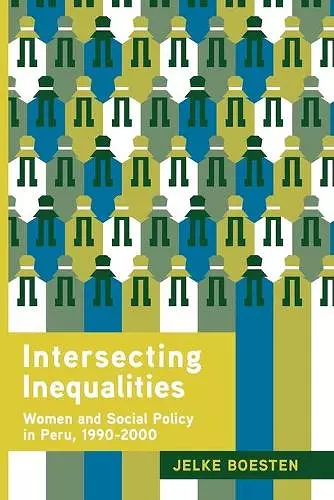Intersecting Inequalities
Women and Social Policy in Peru, 1990–2000
Format:Paperback
Publisher:Pennsylvania State University Press
Published:15th May '13
Currently unavailable, and unfortunately no date known when it will be back
This paperback is available in another edition too:
- Hardback£55.99(9780271036700)

Intersecting Inequalities examines how food aid, population policies, and policy against domestic violence reflected and reproduced existing intersecting inequalities based on race, class, and gender.
Examines how food aid, population policies and policy against domestic violence reflected and reproduced existing inequalities based on race, class and gender in 1990s Peru.
As the only male head of state to address the Fourth World Conference on Women in Beijing in 1995, Alberto Fujimori projected an image as a promoter of progressive policies to improve the condition of women, especially the poor, in society. And indeed, during his tenure, the Peruvian government did pursue such policies in several areas, including poverty relief, population control, and domestic violence. In Intersecting Inequalities, Jelke Boesten uses these policies as case studies, examining the relationship between gender/race/class/ethnic divisions and the state in its project of nation-building. Her investigation reveals that policies meant to further women’s development and emancipation often reproduced the marginality they were supposed to fight. She also explores the strategies women developed to negotiate with and challenge the state.
“Intersecting Inequalities is an innovative, nuanced exploration of women’s organizations and state policy frameworks in contemporary Peru. By using the lens of intersectionality to frame her study, Boesten provides us with a remarkable account of how gender, race, ethnicity, and class intersect to (re)produce marginality in the lives of indigenous and mestiza women as they interact with public institutions, NGOs, and even feminists. Her interdisciplinary approach challenges the very foundations of traditional social science fields and begs us to ask pressing questions about how neocolonial societal institutions and neoliberal policy processes continue to stratify Latin American societies and create irreconcilable differences among women—the supposed beneficiaries of modern feminism.”
—Amy Lind, University of Cincinnati
“In this provocative study of poor women’s organizations in Peru in the 1990s, Jelke Boesten raises most of the fundamental issues of transnational feminism and development facing the world today. Focusing on reproductive rights, domestic violence, and poverty relief, Intersecting Inequalities examines some of the ways in which women’s local organizations in the global South, particularly in Peru, have wrestled with authoritarian and violent governments, tangled with women’s national and international nongovernmental organizations (NGOs), and faced down mates and other family members who wanted to maintain existing social relations. Avoiding easy answers, Boesten points to some of the successes and pitfalls in seeking health care, freedom from violence, and adequate food supplies to show how women’s groups can promote either progressive or right-wing political policies. This gripping book is a must-read for historians of transnational feminism, policy makers, leaders of NGOs, and others hoping to create new institutions to solidify social citizenship and justice for women around the world.”
—Temma Kaplan, Rutgers University, author of Crazy for Democracy: Women in Grassroots Movements and Taking Back the Streets: Women, Youth, and Direct Democracy
“An engaging bottom-up account of how social policies are understood by rural and urban poor women in Peru.”
—Christina Ewig Journal of Latin American Studies
“[Intersecting Inequalities] contribute[s] to our understanding of the relationship between women and the state in Latin America, and [is a] stimulating [addition] to our knowledge of comparative gender politics, expressed in [a] compelling [narrative] that force[s] us to abandon stereotypes and recognize the importance of history and institutions.”
—Jane S. Jaquette International Feminist Journal of Politics
“Methodologically rigorous and insightful, especially the use of audiodiagnosticos (life stories). Outstanding book, highly recommended for students of Latin American and women’s studies.”
—I. Coronado Choice
“This is perceptive, admirably balanced, and a welcome counterpoint to much that has been written on the Fujimori years, which has focused—perhaps excessively—on the decline of social movements and of civil society more generally, the demise of established political parties, and the disintegration of the political fabric. It is also a virtue that Boesten branches out from the much-studied capital of Lima to include not one, but two, case studies from the Peruvian highlands.”
—Gerd Schönwälder Latin American Research Review
ISBN: 9780271036717
Dimensions: 229mm x 152mm x 13mm
Weight: 272g
192 pages